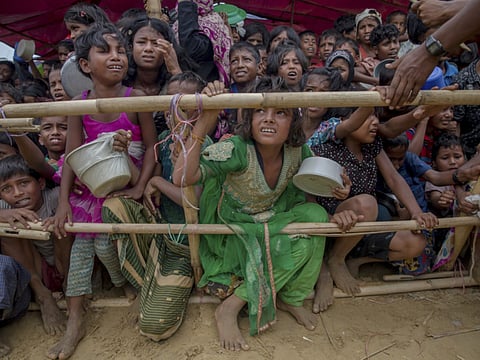Philanthropy cannot substitute government aid
Donors cannot compensate for the cuts in international aid budgets by states across the globe

In the last few decades, philanthropy has enjoyed a renaissance. United States citizens contributed $390 billion (Dh1.43 trillion) to charity last year, while 150 billionaires around the world have signed a pledge to give away at least half their wealth. We will see the energy of this movement first-hand at the sixth Global Education & Skills Forum, taking place in Dubai later this month, when more than 40 philanthropic organisations will discuss how they can make the greatest impact with their resources globally.
Our discussion comes at a time when philanthropy is besieged by criticism. The current fractious mood over global inequality means that large-scale giving by the world’s wealthiest individuals is often seen as suspect. There has been a vicious backlash, with, according to one study, a 15-fold increase in negative coverage about philanthropy between 2000 to 2015.
One frequent criticism is that philanthropy is substitute for government aid, allowing governments to decrease their aid budgets and avoid radical political solutions. However, this ignores the resources of government aid compared to philanthropy: The reach of even large philanthropic foundations is still much smaller than that of government aid, and most foundations cannot undertake large-scale humanitarian or social projects on their own.
Rather than a substitute, philanthropy can accomplish goals that, for structural reasons, governments find difficult. Insulated from the electoral cycle, philanthropists can fund change over many decades. In a Harvard Business Review analysis of 15 social-change movements — from polio eradication to the Fair Food Programme — nearly 90 per cent of historically successful social-change efforts were found to take more than 20 years.
Governments also have a greater number of restrictions on the types of intervention they can support, and the speed with which they can react. Government spending requires rigorous auditing and consensus building, which can limit how bold they can be. Philanthropic foundations can implement disruptive solutions without filtering every decision through layers of bureaucracy.
However, for all its advantages in principle, philanthropy must still do more for the world’s poorest and most vulnerable. Too often there is competition between philanthropists when collaboration would allow resources to go further. Philanthropists working alongside each other has the greatest likelihood of creating long-lasting systemic improvements. A new organisation, Co-Impact, has been founded in order to bring philanthropists together to pursue bigger goals, help them pool their resources more efficiently, and match newer donors with ambitious social projects.
In my own area of interest — education — we need to gather more evidence about what works. The impact of philanthropy across vast areas of policy in many countries is simply unknown, according to a study by NGO 3IE. Programmes ranging from teacher training to computer-assisted learning are often carried out without knowing whether they are effective. Despite expectations, measures in Kenya to halve class sizes and provide more textbooks did little to improve results. Meanwhile, unorthodox methods such as cash transfers to the families of poor children increased attendance for children of all ages across different countries.
Second, we must not become intoxicated by the promise of new technologies. Donating laptops sounds attractive, but will be ineffective if schools have an intermittent electricity supply and no access to broadband. Any technology must take into account local conditions — and be judged as a success or failure by how far it improves basic skills. Instead, we must not lose sight of basic, well-evidenced measures, such as providing food to children at school. For example, the Akshaya Patra Foundation programme is making a huge difference by serving fresh lunches to 1.6 million schoolchildren across India every day, facilitating education and encouraging children to attend.
Third, we need to improve our communication of education issues. Contributions to global health vastly outweigh those given to education: one study found that US private philanthropy contributed 53 per cent of its grants to health, but only 9 per cent to education. This is partly because, over the past few decades, global health has communicated its message with an emotional punch. This is no criticism: the progress in lowering the death toll from disease has been one of the greatest achievements of the 21st century and the result of effective campaigning.
However, the same toll of despair associated with poor health comes just as surely from a poor education. Failure to learn in school is a cancer that spreads — weakening individuals, societies and nations in every conceivable way. It is an invisible threat. The story of a malnourished or sick child can be told through a single picture, but there are no stark images that convey the squandered talents, the frustrations, and the loss of hope that come with an education denied. All involved in education philanthropy must find a more compelling way of telling this story.
Finally, and perhaps most importantly, achieving results requires collaborations with Government: In fact, according to a study by Harvard Business Review, 80 per cent of successful initiatives also require changes to government funding, policies, or actions. Only by working closely with governments can we strengthen public systems of health and education to achieve a positive and lasting impact.
Yet, governments everywhere are making deep cuts to aid budgets. This year alone, the EU has proposed a 6.5 per cent cut to the 2018 aid budget compared to 2017 spending. Education has been particularly neglected — with international aid levels falling since 2010. At a time when the number of children out of school in developing countries is rising again, Governments are choosing not to prioritise education aid. However intelligently they work, philanthropists cannot plug this gap alone.
Vikas Pota is the chief executive of Varkey Foundation.


